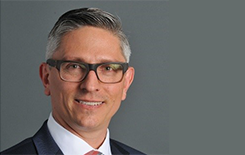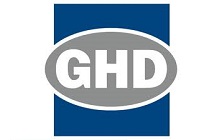
Kurt Beil remains incredibly upbeat given the enormity of the challenges he has been faced with in the first twelve months in post as northern hemisphere environment market leader at the Australian-headquartered professional services firm, GHD.
The remit he is charged with is to expand and differentiate the 10,000 employee-owned company’s market presence in the environmental sector, leveraging its technical innovation strengths, globally connected business and client service excellence across North America, the UK/Europe and Middle East. This all made it a "very exciting proposition" for Beil "to set the case for the next evolution of the business driven by digital transformation and moving into more strategic consulting".
"I was really attracted by GHD’s vision and values as an agile, employee-owned organisation; the client-centric and entrepreneurial culture; and a firm that values, recognises and rewards the expertise and talents of our people. It has been a highly successful business that has embraced ongoing transformation in order to maintain a strong trajectory for the future," he qualifies.
Beil joined GHD following a 24-year stint at a larger publicly-traded rival. "There are many advantages to being a top-tier mid-size firm in this industry...one is being not driven to drive growth for growth’s sake."
He reveals the firm’s ambition is not to be the biggest player in the environmental marketplace, but to be the top performing privately-held company of its size and scale. "By using intelligent solutions, leveraging data and analytics, and leading-edge technology, we are seeking to transform our business and lead at the intersection of the natural, developed, and digital environments in North America and across the globe."
Environmental stats
GHD’s global environmental contingent accounts for around 30% of the overall business, which hit record gross revenues of A$2.16bn (US$1.5bn) in the last financial year ending June 2019, making a significant contribution to its profit base and continuing to serve as an engine for strategic growth of GHD as it has done during the history of the company to date. "Environment is absolutely core to the group business and is in our DNA; unlike some of our peers which have de-emphasised that component, it is where GHD is doubling down."
Beil also explains that while GHD dominates in its home Australian market across all of its key sectors (which in addition to environment also include water, energy, property & buildings and transportation), in North America the water and environment business are where the firm’s key strengths lay. This is partly owing to the heritage of its legacy acquired firms such as the Canadian-headquartered CRA, with which it combined forces back in 2014.
In fact, North America accounts for over 80% of the 3,000-strong global environmental consulting business, followed by Australia and Asia-Pacific (c15%), while the footprint in Europe and the Middle East remains significantly smaller; "but with high growth potential for us in the markets that we strategically choose to play in," says Beil.
"We see environmental work as an enabler to win large capital investment projects for the other parts of the multidisciplinary business." In the Middle East for instance GHD is seeing opportunities for coastal restoration and impact assessment work for the environment team which can lead to broader openings and, globally, environment is a critical leading solution in the early stages of the life cycle of infrastructure, water, and property programmes.
Now of course there’s the lens of COVID-19 added to the mix.
Virus impacts - finding the positives
Beil says that in the UK, where much of GHD’s current EC workload is tied to infrastructure and development planning activities, there has been less of a material impact on the business than in North America given the latter's exposure to the oil & gas and automotive markets. Work supporting construction sites in Eastern Canada also literally ceased overnight, but with early signs of coming back.
"We started early to try and recognise the new challenges our clients were facing and how to pivot the business in response to their evolving needs. While we have experienced a slowdown in some areas of work, others are accelerating; for example where there are no longer plant access restrictions for some municipal client organisations and Fortune 500 landowners due to staff working remotely. We’re supporting these types of projects following strict health & safety protocols."
Then there’s the chemicals industry which is benefiting from the low oil price for its feed stock production, which unlocks buying power and capital investment programmes leading on to environmental planning and permitting support work for firms like GHD. It's another example of where the pandemic and its economic consequences have become an unintended ‘accelerator’.
A further silver lining Beil highlights has come from the adaption to home-based desktop working and subsequent rapid adoption of a more advanced digital toolbox, which he believes "has not necessarily been a top priority for clients until now". GHD launched its digital arm as a standalone unit two years ago - with the core aim of GHD Digital being to complement its traditional skills in engineering, architecture and environmental consulting.
"Leveraging digital ways of working and digital transformation are game-changing for the business and really exciting," he adds.
The group’s acquisition of the boutique, UK-based data analytics and ‘people movement’ business, Movement Strategies, earlier this year is also looking remarkably fortuitous for GHD. Movement Strategies’ nuanced offering includes social distancing solutions and sensor-based technology to help monitor crowd movement and will help prioritise people’s safety as they come back to work, commute to cities, and attend public events again. Its services are understandably very much in demand as organisations’ grapple with planning for the post-lockdown reopening.
"The leadership team have been conscious not to give in to a fear-based mindset"
And on the subject of economic recovery, Beil is in full agreement with the AECOM chief executive’s recent assertion that national infrastructure stimulus packages will be critical to the post-crisis economic rebound. And that there is a need to expedite shovel-ready programmes with the environmental component "crucial to unlock that".
He does not believe that there will be any significant long-term damage to the broader sustainability and climate resilience agenda given the very significant traction of the ESG debate, and arguably even sharper focus brought about through the global pandemic relating to stakeholder value, how firms look after their employees and interruption to global supply chains. In fact, he believes that ESG will rise in prominence as business reconsiders what future resilience and ‘privilege to operate’ look like in the post-COVID world.
Growth outlook and mindset
After a strong year of growth in 2018/19, which saw GHD’s revenues up by 13% and mainly organically, recent financial indicators are that the company is still on track - "through successful pivoting and reprioritisation" - to finish the current financial year (2019/20) in line with its pre-COVID set targets. "Much of the environmental work we do is deemed ‘essential’ and is still progressing but I do expect a time lag on the economic growth patterns impacting the environmental services space as we have seen during past recessions," says Beil.
For GHD this is likely to mean that 2020/21 will be a defining period. Although Beil is very confident in the agility and resilience shown to date by GHD’s staff, there is more of a challenge perhaps when it comes to how clients are coping. But another gift to come out of the crisis is that "we’ve been able to engage in more high quality client conversations, as well as adopt a much more flexible, tolerant and supportive way of working internally which flows through to the client experience also".
"The leadership team have been conscious not to give in to a fear-based mindset; quite the opposite we’ve adopted a growth mindset to help us make smart decisions in line with our original five-year strategic cycle," he adds.
It’s also worth noting that GHD is still hiring new people, although in lockdown the induction programme looks a little different Beil acknowledges. This is all indicative of GHD’s view of the 'new normal' as an accelerator for its business. "The rapid market changes we are observing are a breeding ground for innovation and present an opportunity for a company like ours to emerge as market leaders," says Beil.
"We are positioning for a rapid ramp up as we come out the other side of the crisis, following the anticipated shifts towards federal and public sector income streams. I truly believe that what we have learned through the crisis and the way we have responded will ultimately make us a smarter and stronger firm on the other side and even more prepared for the uncertainties of the future."
GHD currently ranks twelfth in the world as an environmental consulting provider, according to Environment Analyst’s latest global industry rankings, but has clear aspirations to ascend towards the top tier: "We want to be a recognised brand alongside the likes of ERM and WSP."
In particular, Beil sees a significant opportunity to grow the digital and technology side of the environment business, with a move towards predictive and ultimately prescriptive analytics, which should help realise this goal, as will the positive-minded leadership through this crisis/transformative period.

